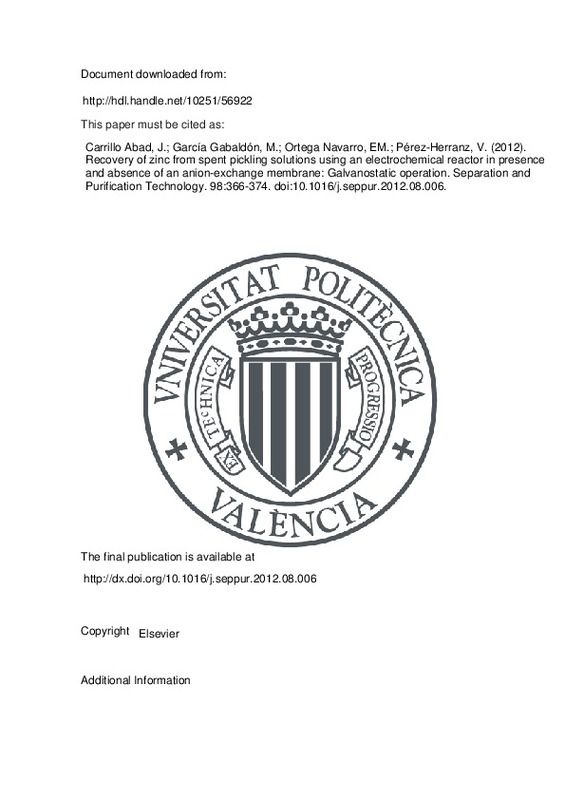Carrillo Abad, J.; García Gabaldón, M.; Ortega Navarro, EM.; Pérez-Herranz, V. (2012). Recovery of zinc from spent pickling solutions using an electrochemical reactor in presence and absence of an anion-exchange membrane: Galvanostatic operation. Separation and Purification Technology. 98:366-374. https://doi.org/10.1016/j.seppur.2012.08.006
Por favor, use este identificador para citar o enlazar este ítem: http://hdl.handle.net/10251/56922
|
Título:
|
Recovery of zinc from spent pickling solutions using an electrochemical reactor in presence and absence of an anion-exchange membrane: Galvanostatic operation
|
|
Autor:
|
 Carrillo Abad, Jorge
Carrillo Abad, Jorge

 García Gabaldón, Montserrat
García Gabaldón, Montserrat

 Ortega Navarro, Emma María
Ortega Navarro, Emma María

 Pérez-Herranz, Valentín
Pérez-Herranz, Valentín
|
|
Entidad UPV:
|
Universitat Politècnica de València. Departamento de Ingeniería Química y Nuclear - Departament d'Enginyeria Química i Nuclear
|
|
Fecha difusión:
|
|
|
Resumen:
|
The performance of a one- and two-compartment electrochemical reactor under galvanostatic control for zinc recovery present in the spent pickling solutions is studied in this paper. These solutions, which mainly contain ...[+]
The performance of a one- and two-compartment electrochemical reactor under galvanostatic control for zinc recovery present in the spent pickling solutions is studied in this paper. These solutions, which mainly contain ZnCl 2 and FeCl 2 in aqueous HCl media, come from the hot dip galvanizing industry. The effect of the anion-exchange membrane (AEM) on the figures of merit of the electrochemical reactor is analyzed. In the absence of iron in solution, as the current value was shifted towards more negative values, the zinc fractional conversion increased because of the increase in the zinc reduction rate. However, the increase in current values made current efficiency decrease due to the hydrogen-reduction side reaction, which caused an increment in the specific energy consumption. The presence of iron in synthetic solutions led to a decrease in current efficiency associated with the reverse redox Fe 2+/Fe 3+ system and to the enhancement of the HER, which also induced increments in the local pH and the subsequent zinc redissolution. These adverse effects related to the presence of iron could be minimized by the interposition of an AEM. In this case, the zinc redissolution was eliminated which enabled zinc conversion values close to 100% together with higher current efficiencies as the consumption of current by the system Fe 2+/Fe 3+ was diminished. © 2012 Elsevier B.V. All rights reserved.
[-]
|
|
Palabras clave:
|
Chlorine
,
Electrochemical deposition
,
Iron
,
Pickling solutions
,
Redissolution
,
Zinc electrodeposition
,
Adverse effect
,
Anion exchange membrane
,
Current efficiency
,
Electrochemical reactor
,
Figures of merits
,
Fractional conversion
,
Galvanostatic control
,
Galvanostatic operation
,
Hot-dip galvanizing
,
Negative values
,
Re-dissolution
,
Side reactions
,
Specific energy consumption
,
Synthetic solutions
,
Zinc recovery
,
Zinc reduction
,
Electric reactors
,
Energy utilization
,
Fluidized bed combustion
,
Hydrogen
,
Pickling
,
Reduction
,
Zinc
|
|
Derechos de uso:
|
Reserva de todos los derechos
|
|
Fuente:
|
Separation and Purification Technology. (issn:
1383-5866
)
|
|
DOI:
|
10.1016/j.seppur.2012.08.006
|
|
Editorial:
|
Elsevier
|
|
Versión del editor:
|
http://dx.doi.org/10.1016/j.seppur.2012.08.006
|
|
Código del Proyecto:
|
info:eu-repo/grantAgreement/GVA//GV%2F2010%2F029/
info:eu-repo/grantAgreement/UPV//PAID-06-08/
|
|
Agradecimientos:
|
Authors want to express their gratitude to the Universidad Politecnica de Valencia for the economic support in the Project Reference PAID-06-08, and to the Generalitat Valenciana for the financing of the Project Reference ...[+]
Authors want to express their gratitude to the Universidad Politecnica de Valencia for the economic support in the Project Reference PAID-06-08, and to the Generalitat Valenciana for the financing of the Project Reference GV/2010/029.
[-]
|
|
Tipo:
|
Artículo
|







![[Cerrado]](/themes/UPV/images/candado.png)


